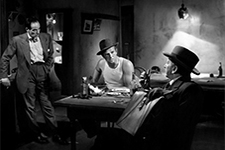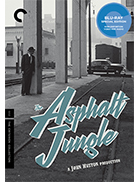The Asphalt Jungle
|  If one account is to be believed, John Huston came to direct The Asphalt Jungle—which turned out to be not only one of the prolific filmmaker’s most iconic works, but probably the most influential heist movie ever made—because of Gregory Peck’s eye. In 1949, Huston was fulfilling a contract obligation to MGM by directing the Roman epic Quo Vadis; during preproduction, Peck, the film’s star, was diagnosed with an eye infection, which delayed the start of the shooting (either that or there was serious disagreement between MGM’s brass and members of the production team, including Huston, whose progressive politics did not mesh with MGM honcho Louis B. Mayer’s arch-conservatism). Either way, Huston ended up bailing on the film (Mervyn LeRoy took over the directing reins and Peck was replaced with Robert Taylor), which left him looking for another project. Depending on which account you read, he either discovered or was assigned the recently published novel The Asphalt Jungle (1949) by W.R. Burnett, whom Huston had previously adapted as a screenwriter for Edward L. Cahn’s Law and Order (1932) and Raoul Walsh’s High Sierra (1941). Huston worked with Ben Maddow (who went on to script Huston’s 1960 western The Unforgiven) to quickly and efficiently adapt Burnett’s novel, keeping much of its dialogue, plot, and underlying themes about treachery and betrayal among thieves. The plot, which unfolds entirely in an unnamed Midwestern city, is set in motion by the release from prison of Doc Erwin Riedenschneider (Sam Jaffe), an aging criminal mastermind who wants to put together “one last heist” so that he may retire in luxury in Mexico. He takes his idea to a bookie named Cobby (Marc Lawrence), who acquires funding from a tragically corrupt lawyer named Alonzo Emmerich (Louis Calhern). Unbeknownst to Cobby and Doc, Emmerich, despite all appearances to the contrary, is drowning in debt due to all the money he has spent keeping his girlfriend (Marilyn Monroe in her first major role) happy. Doc nevertheless goes about assembling a team of seasoned professionals to pull off the heist, which involves robbing millions of dollars in jewels from a vault in a jewelry store. The team eventually includes the safecracker Louis Ciavelli (Anthony Caruso), getaway driver Gus Minissi (James Whitmore), and muscle Dix Handley (Sterling Hayden). The heist itself, which is depicted in a brilliantly sustained 11-minute sequence sans dialogue, goes off with a hitch—almost. At the very end, a security guard arrives, and Dix when knocks him out, his gun discharges and hits Ciavelli, fatally wounding him. From there, the police begin to close in as the carefully modulated plot unravels, partially out of unforeseen circumstances and bad luck, but mostly out of human greed and avarice, which time and time against leads characters to their doom (it is no wonder that the Production Code had little problem passing the film). The Ashphalt Jungle works on a number of levels. First and foremost, it is a cracking-good crime story almost perfectly told. Huston had already directed a number of now-classic films about greed, crime, and betrayal, most of which starred Humphrey Bogart, including The Maltese Falcon (1941), Key Largo (1948), and The Treasure of the Sierra Madre (1948), and if elements of The Asphalt Jungle feel in any way rote or overly familiar, it is only because so many filmmakers—including great ones like Jules Dassin and Jean-Pierre Melville—have made such extensive use of them over the past 67 years. The “one last heist” scenario was certainly old hat even by 1950, but Huston and his cast of inveterate character actors invest the story with such life and nuance that it takes on a sense of grim realism. There are times when the characters, especially Police Commissioner Hardy (John McIntire), are given to overly prescriptive speeches (in Hardy’s case, surely to appease the Production Code Administration by making it absolutely, fundamentally clear that the characters’ behavior is wrong), but most of the dialogue has a deliciously hard edge that is just stylized enough to be memorable, but so much that it sounds artificial. On another level, the film works as a cagey depiction of various human foibles and flaws and how they can lead to one’s downfall. As Emmerich suggests as one point, crime can be seen as a malformation of human genius, an astute observation that is both perverse and sad. All of the criminals are driven by various desires, and not always what you would expect. Dix is the most romanticized of the criminal gang; as he tells his fawning girlfriend Doll (Jean Hagen), all he wants to do is get back to the horse farm where he grew up, which comes to stand as a symbol of respite from the corruption of the big city streets evoked in the film’s title. Yet, his tendency toward violence proves to be his undoing, just as Doc’s unseemly obsession with young women turns out to be his. Emmerich is already a victim of his own lust and greed before the plot begins unfolding, and everything he does to try to hide it proves to be a thin and temporary veneer. There is no escaping fate in The Asphalt Jungle, although the film’s strongest and most lasting impression is that our individual fates are nothing if not our own creation.
Copyright © 2017 James Kendrick Thoughts? E-mail James Kendrick All images copyright © The Criterion Collection | |||||||||||||||||||||||||||||||
Overall Rating: 


 (3.5)
(3.5)


